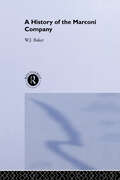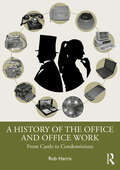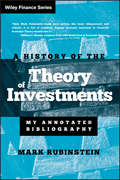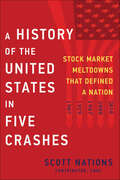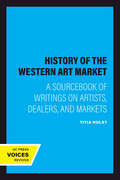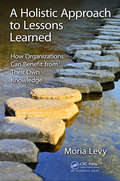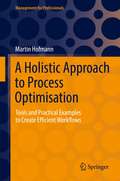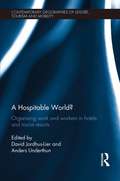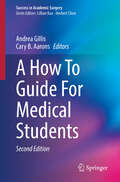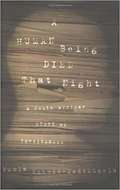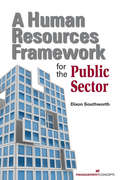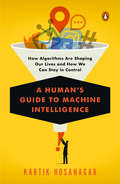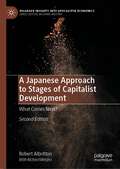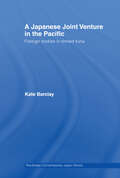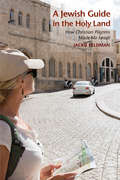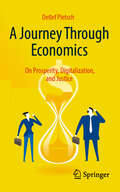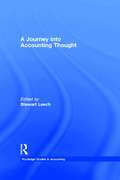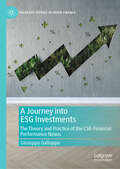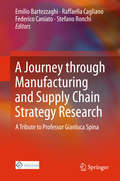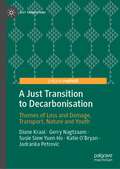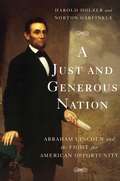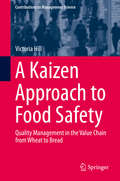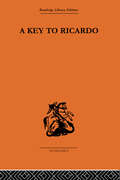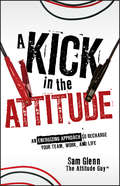- Table View
- List View
A History of the Marconi Company 1874-1965
by W. J. BakerThis accessible work provides a detailed picture of the history of one of the most important companies in the electronic industry.
A History of the Office and Office Work: From Castle to Condominium
by Rob HarrisThis book brings together the office and office working as an economic construct, as a business function, as a building type and as a mode of work. It explores social and economic relations, and it traces the evolution of work and the environment and equipment needed to support it over the last 400 years. In so doing, it helps to fill a void in popular understanding of the office.The role of the office has been examined over the past three years in ways that it has never been examined before. Whilst the existential crisis arising from COVID-19 has settled somewhat, there remain big questions over the future of office workers and office real estate. This book is a timely, well-researched and fascinating contribution to the debate.Rob Harris explores how the nature of work has changed, and continues to change, placing the events surrounding COVID-19 into a longer-term perspective and asking what is the future of the office? Will it go through a radical reinvention? How will office work evolve in the future? Whither office buildings? The book emphasises the continuum of change and that today’s events are simply the latest stage of change, rather than something entirely novel.This book will be of interest to anyone with a stake in the built environment, whether as an investor, occupier, owner, manager or advisor. It is equally accessible to those with a non-technical background, including students on courses such as economic history, economics, geography, real estate and urban planning.
A History of the Theory of Investments: My Annotated Bibliography (Wiley Finance #335)
by Mark Rubinstein"This exceptional book provides valuable insights into the evolution of financial economics from the perspective of a major player." -- Robert Litzenberger, Hopkinson Professor Emeritus of Investment Banking, Univ. of Pennsylvania; and retired partner, Goldman Sachs A History of the Theory of Investments is about ideas -- where they come from, how they evolve, and why they are instrumental in preparing the future for new ideas. Author Mark Rubinstein writes history by rewriting history. In unearthing long-forgotten books and journals, he corrects past oversights to assign credit where credit is due and assembles a remarkable history that is unquestionable in its accuracy and unprecedented in its power. Exploring key turning points in the development of investment theory, through the critical prism of award-winning investment theory and asset pricing expert Mark Rubinstein, this groundbreaking resource follows the chronological development of investment theory over centuries, exploring the inner workings of great theoretical breakthroughs while pointing out contributions made by often unsung contributors to some of investment's most influential ideas and models.
A History of the United States in Five Crashes: Stock Market Meltdowns That Defined a Nation
by Scott NationsIn this absorbing, smart, and accessible blend of economic and cultural history, Scott Nations, a longtime trader, financial engineer, and CNBC contributor, takes us on a journey through the five significant stock market crashes in the past century to reveal how they defined the United States todayThe Panic of 1907: When the Knickerbocker Trust Company failed, after a brazen attempt to manipulate the stock market led to a disastrous run on the banks, the Dow lost nearly half its value in weeks. Only billionaire J.P. Morgan was able to save the stock market.Black Tuesday (1929): As the newly created Federal Reserve System repeatedly adjusted interest rates in all the wrong ways, investment trusts, the darlings of that decade, became the catalyst that caused the bubble to burst, and the Dow fell dramatically, leading swiftly to the Great Depression.Black Monday (1987): When "portfolio insurance," a new tool meant to protect investments, instead led to increased losses, and corporate raiders drove stock prices above their real values, the Dow dropped an astonishing 22.6 percent in one day.The Great Recession (2008): As homeowners began defaulting on mortgages, investment portfolios that contained them collapsed, bringing the nation's largest banks, much of the economy, and the stock market down with them.The Flash Crash (2010): When one investment manager, using a runaway computer algorithm that was dangerously unstable and poorly understood, reacted to the economic turmoil in Greece, the stock market took an unprecedentedly sudden plunge, with the Dow shedding 998.5 points (roughly a trillion dollars in valuation) in just minutes.The stories behind the great crashes are filled with drama, human foibles, and heroic rescues. Taken together they tell the larger story of a nation reaching enormous heights of financial power while experiencing precipitous dips that alter and reset a market where millions of Americans invest their savings, and on which they depend for their futures. Scott Nations vividly shows how each of these major crashes played a role in America's political and cultural fabric, each providing painful lessons that have strengthened us and helped us to build the nation we know today.A History of the United States in Five Crashes clearly and compellingly illustrates the connections between these major financial collapses and examines the solid, clear-cut lessons they offer for preventing the next one.
A History of the Western Art Market: A Sourcebook of Writings on Artists, Dealers, and Markets
by Titia HulstThis is the first sourcebook to trace the emergence and evolution of art markets in the Western economy, framing them within the larger narrative of the ascendancy of capitalist markets. Selected writings from across academic disciplines present compelling evidence of art’s inherent commercial dimension and show how artists, dealers, and collectors have interacted over time, from the city-states of Quattrocento Italy to the high-stakes markets of postmillennial New York and Beijing. This approach casts a startling new light on the traditional concerns of art history and aesthetics, revealing much that is provocative, profound, and occasionally even comic. This volume’s unique historical perspective makes it appropriate for use in college courses and postgraduate and professional programs, as well as for professionals working in art-related environments such as museums, galleries, and auction houses.
A Holistic Approach to Lessons Learned: How Organizations Can Benefit from Their Own Knowledge
by Moria LevyThe book presents a holistic approach to organization performance improvements by lessons learned management. Such an approach is required because specific methods, such as debriefing, task management or procedures updates, do not achieve actual improvements. The presented model spans the entire life cycle of lessons learned: Starting from creating new lessons, moving on to knowledge refining and ending with smart integration into the organizational environment so future re-use of knowledge is enabled. The model also addresses other sources of organizational learning including quality processes and employee experience utilization.
A Holistic Approach to Process Optimisation: Tools and Practical Examples to Create Efficient Workflows (Management for Professionals)
by Martin HofmannThis book provides an overview of the various methods for creating and implementing efficient work processes. The author presents the most important tools for working on improvement projects such as process mapping, Ishikawa diagram, burn-down chart, or Pareto chart. Using successfully realized improvement projects from practice, the concrete implementation of process optimization is illustrated. In addition, it is shown how these methods, which originate from the production sector, can be successfully used in the office sector.
A Hospitable World?: Organising Work and Workers in Hotels and Tourist Resorts (Contemporary Geographies of Leisure, Tourism and Mobility)
by David Jordhus-Lier Anders UnderthunThe hospitality and tourism sector is a large and rapidly expanding industry worldwide, and can rightfully be described as a vehicle of globalisation. Hotels are among the cornerstones of the industry often drawing workers from the most vulnerable segments of multicultural labour markets, accommodating and entertaining tourists and business travelers from around the world. This book explores the organisation of work, worker identities and worker strategies in hotel workplaces, as they are located in heterogeneous labour markets being changed by processes of globalisation. It uses an explicitly geographical approach to understand how different groups of workers experience and respond to challenges in the hospitality industry, and is based on recent theoretical debates and empirical research on hotel workplaces in cities as different as Oslo, Goa, London, Las Vegas and Toronto. A multi-scalar analysis is taken where concrete worker bodies and their physical, emotional and embodied labour are seen in relation to, among other aspects: the regulation of national and regional labour markets, city governments with global city ambitions, and global corporate actors and labour migration patterns. The book sheds light on the hotel workplace as a hierarchical and fragmented social space as well as addressing questions on worker mobility, the fragmentation of work, scales of organisation and how workers can help shape the regulation of their industry. This timely volume brings together contributions from international academics and is valuable reading for all those interested in hospitality, tourism, human geography and globalisation.
A How To Guide For Medical Students (Success in Academic Surgery)
by Andrea Gillis Cary B. AaronsThis book will provide a guide for medical students to self-reflect, build a portfolio, and select a career path equipped with the knowledge to make an informed decision that is the best for them. The editors comprise a diverse spectrum from background, stage of training, type of practice, to career path. This is a timely update taking into account new situations such as the virtual environment for residency applications, the spotlight on residency wellness, and incorporating diversity, equity, and inclusion in our personal and institutional missions.
A Human Being Died That Night: A South African Story of Forgiveness
by Pumla Gobodo-MadikizelaA Human Being Died That Night recounts an extraordinary dialogue. Pumla Gobodo-Madikizela, a psychologist who grew up in a black South African township, reflects on her interviews with Eugene de Kock, the commanding officer of state-sanctioned death squads under apartheid. Gobodo-Madikizela met with de Kock in Pretoria's maximum-security prison, where he is serving a 212-year sentence for crimes against humanity. In profoundly arresting scenes, Gobodo-Madikizela conveys her struggle with contradictory internal impulses to hold him accountable and to forgive. Ultimately, as she allows us to witness de Kock's extraordinary awakening of conscience, she illuminates the ways in which the encounter compelled her to redefine the value of remorse and the limits of forgiveness.
A Human Resources Framework for the Public Sector
by Dixon Southworth MPAAn Entirely New Way to Look at Human Resources in the Public SectorWhat makes a good worker? Why do some people naturally do well at their jobs while others struggle? These questions are at the heart of the human resource (HR) profession. And while there is no shortage of theories about how people achieve success, no one has explained the entire body of HR theories. Until now.In A Human Resources Framework for the Public Sector, Dixon Southworth offers a fresh, new perspective on HR management with the first comprehensive theoretical framework for work performance, tying human resource theories, concepts, and concerns to public administration. With the introduction of the Work Performance Framework (WPF), Southworth offers a roadmap for work performance in the nonprofit and public sectors that focuses on three fundamental objectives of HR programs and services: build human resource capacity, build performance, and build community.
A Human's Guide to Machine Intelligence: How Algorithms Are Shaping Our Lives and How We Can Stay in Control
by Kartik HosanagarA Wharton professor and tech entrepreneur examines how algorithms and artificial intelligence are starting to run every aspect of our lives, and how we can shape the way they impact usThrough the technology embedded in almost every major tech platform and every web-enabled device, algorithms and the artificial intelligence that underlies them make a staggering number of everyday decisions for us, from what products we buy, to where we decide to eat, to how we consume our news, to whom we date, and how we find a job. We've even delegated life-and-death decisions to algorithms--decisions once made by doctors, pilots, and judges. In his new book, Kartik Hosanagar surveys the brave new world of algorithmic decision-making and reveals the potentially dangerous biases they can give rise to as they increasingly run our lives. He makes the compelling case that we need to arm ourselves with a better, deeper, more nuanced understanding of the phenomenon of algorithmic thinking. And he gives us a route in, pointing out that algorithms often think a lot like their creators--that is, like you and me.Hosanagar draws on his experiences designing algorithms professionally--as well as on history, computer science, and psychology--to explore how algorithms work and why they occasionally go rogue, what drives our trust in them, and the many ramifications of algorithmic decision-making. He examines episodes like Microsoft's chatbot Tay, which was designed to converse on social media like a teenage girl, but instead turned sexist and racist; the fatal accidents of self-driving cars; and even our own common, and often frustrating, experiences on services like Netflix and Amazon. A Human's Guide to Machine Intelligence is an entertaining and provocative look at one of the most important developments of our time and a practical user's guide to this first wave of practical artificial intelligence.
A Japanese Approach to Stages of Capitalist Development: What Comes Next? (Palgrave Insights into Apocalypse Economics)
by Robert AlbrittonThis book offers a novel treatment of one of the most important and long-standing research agendas in critical political economy: the theorizing of stages of capitalist development. Albritton advances the work of Japanese economist, Kozo Uno, to explore capital accumulation and its ideological, legal and political supports, not only in the stages of mercantilism, liberalism and imperialism, but also in the post-World War II capitalist stage of consumerism. The power of Albritton’s adoption of this Japanese approach resides in the crisp clarity it achieves over the way stage theorizing of capitalism draws on both economic theory and historical analysis.In the new, fully revised edition, written with Richard Westra, two new chapters are added. One meticulously examines the tendencies of capitalism euphemized as globalization and financialization which followed the crisis of the stage of consumerism. The other deals with current threats to civilization posed by burgeoning militarism, environmental destruction and climate apocalypse. The concluding chapter argues for the necessity of major social change to ensure a liveable future for humanity. The book will be of interest to researchers and students of political economy and the history of economic thought, as well as a wider audience interested in the transformation and crises of capitalism.
A Japanese Joint Venture in the Pacific: Foreign bodies in tinned tuna (Routledge Contemporary Japan Ser.)
by Kate BarclayThe Japanese, and other Asians, are increasingly taking over some of the roles previously played by Europeans in the Pacific islands, which is giving rise to interesting new economic relationships, and interesting new interactions between nationalities. This book considers the role of the Japanese in the Solomon Islands, focusing in particular on a
A Jewish Guide in the Holy Land
by Jackie FeldmanFor many Evangelical Christians, a trip to the Holy Land is an integral part of practicing their faith. Arriving in groups, most of these pilgrims are guided by Jewish Israeli tour guides. For more than three decades, Jackie Feldman--born into an Orthodox Jewish family in New York, now an Israeli citizen, scholar, and licensed guide--has been leading tours, interpreting Biblical landscapes, and fielding questions about religion and current politics. In this book, he draws on pilgrimage and tourism studies, his own experiences, and interviews with other guides, Palestinian drivers and travel agents, and Christian pastors to examine the complex interactions through which guides and tourists "co-produce" the Bible Land. He uncovers the implicit politics of travel brochures and religious souvenirs. Feldman asks what it means when Jewish-Israeli guides get caught up in their own performances or participate in Christian rituals, and reflects on how his interactions with Christian tourists have changed his understanding of himself and his views of religion.
A Journey Through Economic Time: A Firsthand View
by John Kenneth GalbraithA renowned economist presents an accessible, far-reaching history of the century's economics from World War I and the Russian Revolution, through the Depression and Keynesian theory, to colonialism's collapse and the rise of the Third World.
A Journey Through Economics: On Prosperity, Digitalization, and Justice
by Detlef PietschAnyone who does not know the history of economics cannot think competently about the future of economics. This book offers an introduction to economic history for those looking for more than just dry theory. The author takes you on a journey through the economy, from its beginnings in the Stone Age to the digitalization of modern times. In addition to the nature and fundamental principles of economics, the book also introduces great thinkers such as Aquinas, Keynes, and Erhard. While ancient philosophers like Plato and Aristotle focused mainly on the ethical dimension of economics, the first modern economist and moral philosopher, Adam Smith, for example, pondered how nations could achieve prosperity. Today, however—in an era where capitalism is increasingly under scrutiny—the question is how prosperity can reach everyone, especially in times of digitalization. Therefore, the book not only addresses economic concepts of the past and present but also offers an intriguing look into the future. Issues of social justice are discussed alongside topics such as digitalization, globalization, and ecology. The second edition has been updated to include a chapter on "Economics in Uncertain Times," which deals, among other things, with the economic consequences of the COVID-19 pandemic and the war in Ukraine.
A Journey into Accounting Thought
by Louis GoldbergThis book explores the role of accountants in business and society. The final work of Louis Goldberg, Professor Emeritus at the University of Melbourne, it aims to raise awareness of the existence and importance of fundamental issues that are often ignored or by-passed in contemporary discussion of accounting. The sixteen chapters assess exactly wh
A Journey into ESG Investments: The Theory and Practice of the CSR-Financial Performance Nexus (Palgrave Studies in Impact Finance)
by Giuseppe GalloppoThis book deals with climate finance and presents a balance between the theoretical framework—as drawn by the most widely cited practitioner-oriented and academic journals in environmental management—and experimental finance. Does sustainability work eventually? This book explores the data from empirical analysis to address this question. The book investigates the effectiveness of Corporate Social Responsibility and its empirical verification by analyzing the correlation between firm-specific ESG characteristics and financial performance, and will be of interest to academics, researchers, and practitioners of sustainable finance and climate finance.
A Journey through Manufacturing and Supply Chain Strategy Research: A Tribute to Professor Gianluca Spina
by Emilio Bartezzaghi Raffaella Cagliano Federico Caniato Stefano RonchiThis book is intended as atribute to Gianluca Spina, the influential and inspiring Professorof Business Management & Organization and Supply Chain Management at theSchool of Management of Politecnico di Milano, who very sadly passed away earlyin 2015. It brings together seven of his most important papers, published inrenowned international journals, and supplements these papers with insightfulcommentaries from friends and colleagues who highlight key messages and valuesof enduring validity. The selected papers offer a clear sense of Spina'sresearch journey over the years and cover the main research streams thatdistinguished his work. They have also been chosen on account of their highimpact, as reflected by the number of citations received, and to represent the mostimportant research collaborations that Spina had established within Italyand abroad. An introductory chapter relates his research to major developmentsin the field of Manufacturing and Supply Chain Strategy and also outlines thevery important contribution that Gianluca Spina made to Management Education.
A Just Transition to Decarbonisation: Themes of Loss and Damage, Transport, Nature and Youth (Just Transitions)
by Gerry Nagtzaam Jadranka Petrovic Diane Kraal Katie O’Bryan Susie Siew HoThis book provides researchers and policy-makers with legal avenues to enable a just transition to decarbonisation. The focus is on the United Nations themes of loss and damage, transport, nature and youth - across Australia and other economies - to significantly reduce CO2 emissions by 2030 and beyond. The four themes scaffold discussions about a just transition beyond the UN Climate Change Conference COP28 in Dubai with the specific issues addressed in this book serving as a starting point for future discussions.
A Just and Generous Nation: Abraham Lincoln and the Fight for American Opportunity
by Harold Holzer Norton GarfinkleIn A Just and Generous Nation, the eminent historian Harold Holzer and the noted economist Norton Garfinkle present a groundbreaking new account of the beliefs that inspired our sixteenth president to go to war when the Southern states seceded from the Union. Rather than a commitment to eradicating slavery or a defense of the Union, they argue, Lincoln’s guiding principle was the defense of equal economic opportunity. Lincoln firmly believed that the government’s primary role was to ensure that all Americans had the opportunity to better their station in life. As president, he worked tirelessly to enshrine this ideal within the federal government. He funded railroads and canals, supported education, and, most importantly, issued the Emancipation Proclamation, which opened the door for former slaves to join white Americans in striving for self-improvement. In our own age of unprecedented inequality, A Just and Generous Nation reestablishes Lincoln’s legacy as the protector not just of personal freedom but of the American dream itself.
A Kaizen Approach to Food Safety: Quality Management in the Value Chain from Wheat to Bread (Contributions to Management Science)
by Victoria HillThis book provides a Management Science approach to quality management in food production. Aspects of food quality, product conformance and reliability/food safety are examined, starting with wheat and ending with its value chain transformation into bread. Protein qualities that influence glycemic index levels in bread are used to compare the value chains of France and the US. With Kaizen models the book shows how changes in these characteristics are the result of management decisions made by the wheat growers in response to government policy and industry strategy. Lately, it provides step-by-step instructions on how to apply kaizen methodology and Deming's work on quality improvement to make the HACCPs (Hazard Analysis and Critical Control Points) in food safety systems more robust.
A Key to Ricardo (Reprints Of Economic Classics Ser.)
by Oswald St. ClaireRicardo is one of the most imposing figures in the history of economic thought, yet at times his writings are among the most obscure. A Key to Ricardo traces, simplifies and clarifies Ricardo's ideas on the principal topics on which he wrote. The book provides a careful analysis of Ricardo's most cryptic passages and also explores areas where Ricardo appears to be mistaken. Setting Ricardo's writings against the context of his contemporaries, the relevance of the Ricardian contribution to subsequent economic thinking is nonetheless made very clear.
A Kick in the Attitude
by Sam GlennWhat Jumper Cables are to A Car Battery this Book is to YOUR Attitude "Good old fashioned advice on how to have a great attitude, delivered in a pithy andinteresting way. " -Karen Leland, bestselling author of Watercooler Wisdom: How Smart People Prosper in the Face of Conflict, Pressure and Change "Sam Glenn is known for his funny and motivational presentations and for his ability to give people a kick in the attitude. Now he has done it in print. " -Stewart Clifford, Enterprise Media "Sam Glenn energizes our worldwide audience with his profound sense of humor andgentle wisdom, making this giant in the motivation industry powerful and approachable. Experience his energy firsthand and feel it wake you up to the life you've always dreamed of. " -Markandeya, Life Without Limitation, EnergyTalkRadio. com "If there were an Attitude Hall of Fame, Sam Glenn and this book would be inducted into it! A Kick in the Attitude is the best book I've ever read on how to take an enthusiasticattitude and crank up your life to a higher, more powerful and successful level!" -Anne Bruce, professional speaker and author of Discover True North and How to Motivate Every Employee "Sam gets it when it comes to attitude. Read A Kick in the Attitude to jumpstart whateverybody needs for success-a great attitude. " -Dr. Charles Stone, pastor and author "No matter what your current 'drama,' the principles in A Kick in the Attitude will give you the motivation to turn any situation around. " -Marlene Chism, author of Success is a Given "Has the economy of 2009 got you down? Is life throwing lemons at you the size of cannon balls? Then stop and read this book. Sam Glenn is 'The Attitude Guy'! He will get you thinking about you and your attitude, then guide you to the understanding that you, and only you, control your attitude. " -Bob Hamm, Senior Account Manager, Omnipress
